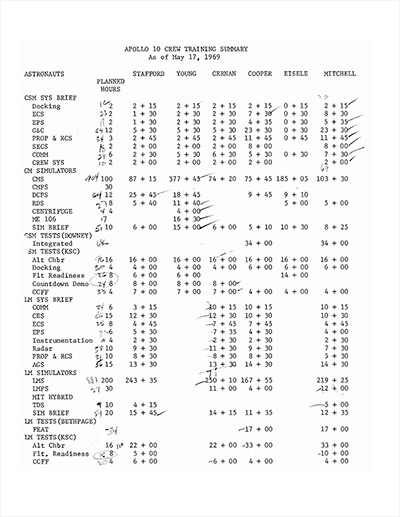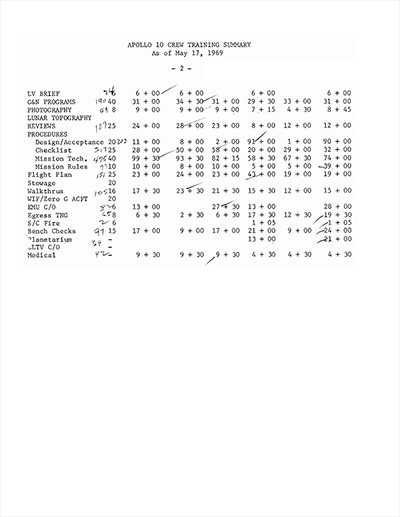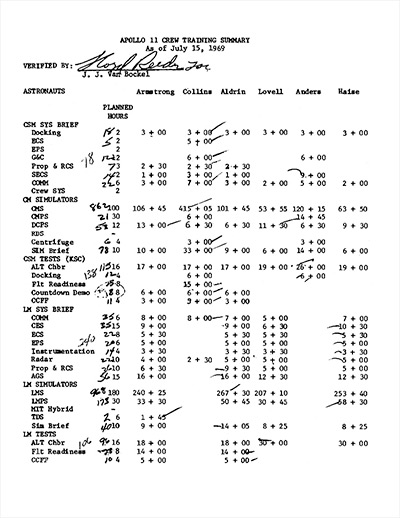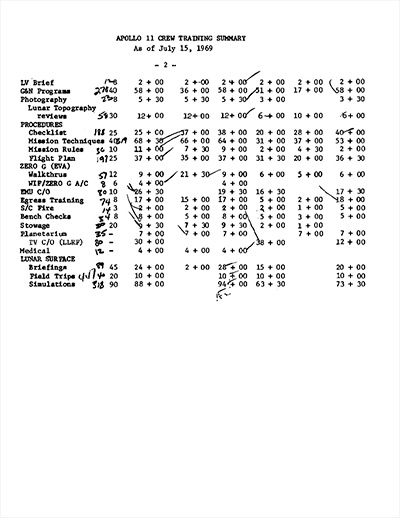|
Author
|
Topic: Astronauts reply to Alan Shepard's command
|
ManInSpace
Member Posts: 114
From: Brooklin, Ontario Canada
Registered: Feb 2018
|
 posted 05-25-2019 02:58 PM
posted 05-25-2019 02:58 PM
  
Slayton later said that Cooper's Apollo 10 Backup CDR assignment was due to a shortage of unassigned qualified commanders; at the time when he had to finalize all the slots for that mission.He went on to say that Cooper had a "small" shot at Apollo 13 if he turned in an "excellent" performance backing up 10; but that in his opinion this had not occurred. There is however, no record indicating that he made this caveat clear to Cooper, when the 10 assignments were handed out. If so, one can see why Cooper felt the way he did; given the usual practice of skipping two flights after a backup slot and then flying on the next mission. |
ashot
Member Posts: 27
From:
Registered: Mar 2010
|
 posted 05-25-2019 04:06 PM
posted 05-25-2019 04:06 PM
  
quote:
Originally posted by Tom:
If having one of the original 7 astronauts go to the Moon was important, they had a candidate who paid his dues... Cooper.
Slayton simply had nobody else available with required qualifications to use as backup CDR position. (Something similar happened with Gemini 10, when the command of the backup crew was given to Bean [who originally was supposed to be Gemini XI backup pilot] — simply, there was no one else available.) Remember that Apollo 7, 8, 9, 10, 11 were all launched in 2-3 months intervals. This gave only 6-7 months for a crew to train for their mission after a rotation. A way to overcome this shortage of commanders, could have been Slayton potentially using both Young and Lovell as commanders (instead of CMPs) and using Cernan and Aldrin as CMPs, but he definitely knew what he was doing and perhaps had a very good reason to do what he did. (This also opens up other "what if" scenarii, eg. Armstrong asking Slayton to keep Lovell as his CMP on Apollo 11, etc.) It seems that while Slayton could have been confident in Cooper, he still felt it would be very hard to sell Cooper to NASA management. Thus the rumors about Stafford being told that he better make sure he flies on Apollo 10. |
canyon42
Member Posts: 238
From: Ohio
Registered: Mar 2006
|
 posted 05-25-2019 07:35 PM
posted 05-25-2019 07:35 PM
   
quote:
Originally posted by ashot:
For AS-204 and 205 both Grissom and Schirra were assigned to prime crews without backing up an Apollo mission.
Well, that's a bit of a circular (?) argument. It's kind of hard to avoid having *someone* in that position. You can't very well serve on a backup Apollo crew when yours are the first ones... |
Delta7
Member Posts: 1505
From: Bluffton IN USA
Registered: Oct 2007
|
 posted 05-25-2019 07:53 PM
posted 05-25-2019 07:53 PM
   
Cooper's "Tiddlywinks" episode probably sealed his fate with NASA management. If it already wasn't sealed. If one follows Slayton's rotation system, Donn Eisele would have been offered the Apollo 10 backup CDR slot after flying as CMP on Apollo 7. But that wasn't ever going to happen. Schirra was retiring, Cunningham wasn't considered lunar landing command material, so Deke's options were pretty limited. Put Cooper in as a stop-gap until he found someone else and hope and pray Stafford stays healthy. Putting on my speculation cap: what if Cooper hadn't been available? (Retired after Gemini or for whatever reason). One possibility is after Apollo 7, Stafford, Cernan and Mitchell are announced as the Apollo 10 prime crew, with Young, Eisele and, say, Irwin as backup crew. Later, does Shepard bump Young? THAT would have created quite an uproar in the astronaut office in my opinion. More likely Shepard gets the Apollo 14 backup CDR/Apollo 17 CDR slot that Collins turned down. |
Tom
Member Posts: 1597
From: New York
Registered: Nov 2000
|
 posted 05-25-2019 08:48 PM
posted 05-25-2019 08:48 PM
   
quote:
Originally posted by Delta7:
One possibility is after Apollo 7, Stafford, Cernan and Mitchell are announced as the Apollo 10 prime crew, with Young, Eisele and, say, Irwin as backup crew.
My point, exactly... if Cooper wasn't considered a proper backup CDR. |
ashot
Member Posts: 27
From:
Registered: Mar 2010
|
 posted 05-26-2019 02:45 AM
posted 05-26-2019 02:45 AM
  
quote:
Originally posted by canyon42:
You can't very well serve on a backup Apollo crew when yours are the first ones...
Sorry — I was not clear. Schirra got a prime crew assignment without serving as a backup prior to it. quote:
Originally posted by Delta7:
More likely Shepard gets the Apollo 14 backup CDR/Apollo 17 CDR slot that Collins turned down.
Or to have Lovell-Anders or Eisele-Haise/Mitchell to back up Apollo 10. Or to "advance" one of Apollo 10-11-12 prime and backup crews to Apollo 10 backup, as 10-11-12 crews were basically trained for very similar missions. |
Henry Heatherbank
Member Posts: 244
From: Adelaide, South Australia
Registered: Apr 2005
|
 posted 05-26-2019 03:56 AM
posted 05-26-2019 03:56 AM
  
quote:
Originally posted by Delta7:
More likely Shepard gets the Apollo 14 backup CDR/Apollo 17 CDR slot that Collins turned down.
What wonderful historical symmetry that would have created: the first American in space, at the time of Kennedy’s “In This Decade” speech, going on to be the last man on the Moon, and closing out the Apollo lunar flights. |
Fra Mauro
Member Posts: 1587
From: Bethpage, N.Y.
Registered: Jul 2002
|
 posted 05-26-2019 04:54 PM
posted 05-26-2019 04:54 PM
   
This is certainly the most controversial of the Apollo crew slots. If Anders was offered a CDR, then maybe he stays.
|
Delta7
Member Posts: 1505
From: Bluffton IN USA
Registered: Oct 2007
|
 posted 05-26-2019 05:26 PM
posted 05-26-2019 05:26 PM
   
Maybe if Shepard's Meuniers wasn't fixed. Move Lovell, Mattingly, Haise to Apollo 13 and assign Anders, Roosa, Mitchell to Apollo 14? |
oly
Member Posts: 905
From: Perth, Western Australia
Registered: Apr 2015
|
 posted 05-26-2019 06:51 PM
posted 05-26-2019 06:51 PM
   
When did Shepard have his surgery, and when was he signed off as medically fit to rejoin the astronaut selection? |
Robert Pearlman
Editor Posts: 42988
From: Houston, TX
Registered: Nov 1999
|
 posted 05-26-2019 09:12 PM
posted 05-26-2019 09:12 PM
   
Shepard's surgery was on May 14, 1968 and he was announced as back on flight status on May 9, 1969. See: Alan Shepard's flight status (exact dates) for more. |
oly
Member Posts: 905
From: Perth, Western Australia
Registered: Apr 2015
|
 posted 05-27-2019 01:09 AM
posted 05-27-2019 01:09 AM
   
Thanks Robert for these dates, It seems that Shepard was medically cleared for flight status on May 9, 1969, and Aug 6, 1969 was the announcing of crews for Apollo 13 and 14.Shepard's oral history interview reveals the following: Shepard: Well, of course, when NASA finally said I could fly again, I went to Deke and said, "We have not announced publicly the crew assignment for Apollo 13. I have a recommendation to make." I had picked two bright, young guys — one of them a Ph.D., and one of them a heck of a lot smarter than I was — and made up a team to go for an Apollo flight. I said, "I would like to recommend that I get Apollo 13, with Stu [Stuart A.] Roosa as command module and Ed [Edgar D.] Mitchell as lunar pilot." Deke said, "I don't know. Let's try it out." So we sent it to Washington, and they said, "No, no way." So we said, "Now wait a minute. Shepard's got to be at least as smart as the rest of these guys, maybe a little smarter." And they said, "Well, we know that. But it's a real public relations problem. Here this guy's just gotten un-grounded and all of a sudden, boom!, he gets premier flight assignment." So then the discussion went on for several days and finally they said, "All right, we'll make a deal. We'll let Shepard have Apollo 14. Give us another crew for Apollo 13," and so that's what happened. |
carmelo
Member Posts: 1047
From: Messina, Sicilia, Italia
Registered: Jun 2004
|
 posted 05-27-2019 10:50 AM
posted 05-27-2019 10:50 AM
   
But Gordo Cooper was so really bad as an astronaut? |
goldbera
Member Posts: 25
From: Melbourne, FL
Registered: Jul 2006
|
 posted 05-28-2019 08:31 AM
posted 05-28-2019 08:31 AM
  
Not at all. From what I've read, it was more the fact that his focus wasn't really in training by that point...more so auto racing I think? |
Delta7
Member Posts: 1505
From: Bluffton IN USA
Registered: Oct 2007
|
 posted 05-28-2019 08:39 AM
posted 05-28-2019 08:39 AM
   
As Michael Collins put it in "Carrying The Fire," Cooper "Did a great job on Mercury, not bad on Gemini, but Apollo seemed too much." In my opinion Cooper's training ethic is what did him in. When queried about why he didn't feel the need to learn the spacecraft systems in depth, he supposedly replied "That's what I have a CMP and LMP for." Maybe he could've landed on the moon blindfolded, but he was too much of a maverick for management's taste by the time Apollo rolled around. |
carmelo
Member Posts: 1047
From: Messina, Sicilia, Italia
Registered: Jun 2004
|
 posted 05-28-2019 09:02 AM
posted 05-28-2019 09:02 AM
   
And if I remember well Cooper was not nice to NASA for that thing of flight allowance (I remember from Tom Wolfe's "The Right Stuff") and for his manners and accent a little "rustic."Is a bit strange that his "comrades" Slayton and Shepard not back him up; He was one of the band of brothers of Mercury (unlike to Glenn and Carpenter). Maybe Shepard remembered the clash for the seat on Mercury-Atlas 9 (after that MA-10 was cancelled), maybe some oddity (announcement of future one's post NASA life) had already emerged. |
ashot
Member Posts: 27
From:
Registered: Mar 2010
|
 posted 05-29-2019 04:21 AM
posted 05-29-2019 04:21 AM
  
I would say, that Slayton did back Cooper up by assigning to Gemini 5, didn't he? |
Skylon
Member Posts: 274
From:
Registered: Sep 2010
|
 posted 05-29-2019 07:36 PM
posted 05-29-2019 07:36 PM
  
Wolfe writes that Cooper was a bit of an "odd man out" among the Original 7. A great "stick-and-rudder" guy, but he lacked the front-line test pilot experience of all but Carpenter. Slayton even writes about how he was confused by Cooper's inclusion in the Original 7 in 1959 because he was involved in engineering at Edwards (something Wolfe points out as well - engineering is said like he was a quartermaster, or chaplain - not an actual test pilot). His "stick and rudder" abilities seemed to give him some leeway ultimately with Slayton, but on Mercury 9, Slayton fought an uphill battle getting Cooper assigned. There were moments during Gemini 5 that didn't seem to earn Cooper many points - how long should Slayton have been expected to keep advocating for Cooper, if by Apollo he was taking a lax attitude towards training? |
Marc05A
Member Posts: 39
From: Reims, France
Registered: May 2009
|
 posted 06-01-2019 04:24 AM
posted 06-01-2019 04:24 AM
   
I just found this memorandum from Deke Slayton, dated December 8th 1967.Gordo Cooper was assigned to Apollo Applications. It clearly suggests that he wasn't really expected to command an Apollo flight.  |
Skylon
Member Posts: 274
From:
Registered: Sep 2010
|
 posted 06-01-2019 09:40 AM
posted 06-01-2019 09:40 AM
  
That memorandum is very interesting, and does show how Slayton utilized Cooper in the Astronaut Office. It's dated December 1967 so by this point Alan Bean, had likely recently been removed from his position as the Astronaut Office's "pointman" for AAP to be a part of Pete Conrad's crew (C.C. Williams died roughly two months prior to this memo). The memo details how the FCOD has limited resources to deal with AAP — as December 1967 is the time of the post-fire recovery and push to get to the Moon, so its rather stark that Cooper, a veteran of two spaceflights is saddled with AAP work. It's also telling how P.J. Weitz and Jack Lousma, were pointed at AAP from an early point, and at least were rewarded for their work with flights. I sometimes wonder how Cooper interpreted everything in regards to his flight assignments. Slayton's rotation was pretty clear. After GT-5, he would have watched all his contemporary Gemini commanders get assignments on Apollo, while he got put on backup for Gemini 12 at the last minute. And then after that EVERYONE else with Gemini experience landed Apollo prime or backup crews. Did he just figure "well, Deke obviously doesn't need me doing grunt-work as a backup — my day is coming" or was he just okay with hanging around NASA, doing the work Slayton or Shepard gave him, and having a job that gave him access to T-38's, hoping his luck would turn and he'd get a flight? Versus say, going back to the USAF? |
Marc05A
Member Posts: 39
From: Reims, France
Registered: May 2009
|
 posted 06-01-2019 11:11 AM
posted 06-01-2019 11:11 AM
   
It looks like Walt Cunningham was a victim of the same kind of dead-end assignment. In a memo from March 1970, he's appointed Branch Chief for AAP, but downgraded to Section Chief for Skylab one year later when other astronauts became available. And he eventually wasn't allowed to fly again... |
Fra Mauro
Member Posts: 1587
From: Bethpage, N.Y.
Registered: Jul 2002
|
 posted 06-01-2019 12:01 PM
posted 06-01-2019 12:01 PM
   
That memo seems to say it all regarding plans for Cooper to fly to the moon! |
oly
Member Posts: 905
From: Perth, Western Australia
Registered: Apr 2015
|
 posted 06-01-2019 11:33 PM
posted 06-01-2019 11:33 PM
   
Cooper proved that his engineering/test pilot experience was valuable during both of his space flights. His Mercury flight required him to manually fly the spacecraft following an electrical system failure due to an electrical fire, and his system knowledge about the fuel cells on the Gemini flight, as well as the re-entry correction following a calculation error, was testament to his talents. He was then put back to focusing on a final Gemini flight that never happened (something that also happened on Mercury). Perhaps his engineering understanding of the spacecraft systems was the reasoning he was "left behind," and also why he may have been considered better suited to lead the AAP. |
Marc05A
Member Posts: 39
From: Reims, France
Registered: May 2009
|
 posted 06-02-2019 12:08 PM
posted 06-02-2019 12:08 PM
   
Cooper's last position at MSC was Assistant for Space Shuttle Program in the FCOD, reporting directly to Deke Slayton (MSC News Release 69-067). He was named to that position in October 1969. Less than a year later, in June 1970, he announced that he will be leaving NASA on July 31, 1970. |
moorouge
Member Posts: 2454
From: U.K.
Registered: Jul 2009
|
 posted 06-03-2019 05:24 AM
posted 06-03-2019 05:24 AM
   
quote:
Originally posted by oly:
His Mercury flight required him to manually fly the spacecraft following an electrical system failure due to an electrical fire...
Are you sure about this? My recollection is that the systems shorted out due to condensation. This is hardly an electrical fire. |
ashot
Member Posts: 27
From:
Registered: Mar 2010
|
 posted 06-03-2019 05:35 AM
posted 06-03-2019 05:35 AM
  
quote:
Originally posted by Fra Mauro:
That memo seems to say it all regarding plans for Cooper to fly to the moon!
He seemed to be a last call for filling in gaps when nobody else was available. And, by the way, Eisele was hardly considered for another flight, either (remember Kraft's reaction on Apollo 7). Under these circumstances, his assignment as backup CMP for 10 also seems as a temporary gap-filler. All this, perhaps, makes Apollo 10 backup crew one of very few crews Slayton likely had no real plans for future use as a whole. Also an interesting observation: in his oral history interview McDivitt does not at all mention the Shepard story and states that he was offered to command Apollo 13 [perhaps, this was after Shepard was moved to 14] along with other options (he states he opted to take over Apollo program instead). |
ashot
Member Posts: 27
From:
Registered: Mar 2010
|
 posted 06-03-2019 06:50 AM
posted 06-03-2019 06:50 AM
  
quote:
Originally posted by Marc05A:
And he eventually wasn't allowed to fly again...
The original plan of Slayton was to move Cunningham to Apollo Applications after Apollo 7. It seems to me that the real reason Cunningham never flew again was more on Kraft's side rather than Slayton's (in a way, I see a parallel between Carpenter, Eisele, and Cunningham).
|
oly
Member Posts: 905
From: Perth, Western Australia
Registered: Apr 2015
|
 posted 06-03-2019 03:09 PM
posted 06-03-2019 03:09 PM
   
quote:
Originally posted by moorouge:
Are you sure about this?
From Cooper's oral history interview: Cooper: Oh, yeah. The .05 g green warning light came on, which is the light that tells you you're starting to reenter. I was sure that I wasn't reentering, because there had been nothing to slow down my speed at all. And, of course, as usually happened on these missions, we had long spaces that we were out of radio contact; and I was out of radio contact when this happened. So when I got in radio contact first time, the Cape was kind of concerned when they heard about this light on. Then we proceeded on the next orbit or so to try to analyze, go through various procedures to try to find what it was. And we realized I was, slowly but surely, having an electrical fire from my relays; and they did short out the inverters. So, eventually I lost my total electrical system.Neal: You lost the total electrical system? Cooper: The total electrical system. |
oly
Member Posts: 905
From: Perth, Western Australia
Registered: Apr 2015
|
 posted 06-04-2019 01:15 AM
posted 06-04-2019 01:15 AM
   
A post flight analysis of the Faith 7 spacecraft determined that electrical short circuits had occurred within the electrical power connector of the ASCS amplifier-calibrator, and another connector. "Strong evidence exists that free water in the spacecraft cabin had been present near the multipin power-plug connection and eventually provided a current path in the insulation between the d-c power and grounding pins." Both the suit and cabin CO2 levels had been recorded as increasing prior to the electrical system failure. The inverters installed to Faith 7 were of a new design, however they tested serviceable during post flight inspection. Cooper's work to control the spacecraft manually during the reentry was applauded, and his dedication to the program and working knowledge of the systems were a key reason why he was assigned to work towards the flight of the last Mercury spacecraft. As has been presented earlier in this topic, Slayton had faith in Cooper's abilities. Cooper has also been recorded if having faith in Shepard, and as far as I know, has not been recorded as disliking Shepard's inclusion on a lunar mission. |
Andy Anderson
Member Posts: 82
From: Perth, Australia
Registered: Dec 2009
|
 posted 06-04-2019 11:28 PM
posted 06-04-2019 11:28 PM
   
Regarding the assignment of Al straight to a flight, in Neal Thompson's book on Alan Shepard, "Light This Candle" he states; Some were amazed, some were pissed, but few were really surprised... But no one was in a position to tell the first American spaceman he had to wait in line. I guess we know what Jim McDivitt thought but I'm sure that we will never fully know the actual politics, personal maneuvering, and personality interactions that went on behind the scenes with the other astronauts up to the end of the Apollo missions — at least by them expressing such things in public. quote:
Originally posted by Delta7:
Maybe he could've landed on the moon blindfolded, but he was too much of a maverick for management's taste by the time Apollo rolled around.
As already mentioned above and also in Deke's autobiography regarding Gordo; ...he was a hard sell to management because he never really put his heart into training and seemed to spend a lot of his time being more interested in racing cars. I'm curious as to what Deke meant by saying that Cooper was a "hard sell to management." If he had put him up to "management" for Apollo 13, would they have knocked him back as they subsequently did for different reasons when he put Al up for 13?And who actually in "management" would that have been, and how much detail would they have had on the personal traits of the astronauts at the time of the Apollo assignments sufficient for them to overrule Deke? Here is the training summary for Apollo 10 and for some sort of comparison, the one for Apollo 11, which simply shows the numbers of hours each crew member spent training. I don't know if you can draw too much from the hours spent in training as each mission had different objectives or of course, how much "effort" was put into those hours.  


By the way, Al had done 263 hours in the CSM and 481 hours in the LM simulators by the time he got to fly Apollo 14 after the delay caused by the Apollo 13 mission. |
















